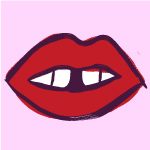By Loose Lips Mag
@looselipsmag
On this year’s International Women’s Day, we are proud to be surrounded by a network of woke, outspoken, hard-working, diverse women who use their platform and their experiences to enlighten and educate their own communities. This year, we interviewed seven peers about International Women’s Day: what that holiday means to them, how they are decolonizing their work, and what their ideal feminist utopia would look like (would we need a day like International Women’s day in a perfect world?).
Join us in celebrating this day the only way we know how, by sharing the voices and stories from the women who uplift and inspire us every day of the year.
Adhel Arop
@adeezia_adhel
Pronouns: She/Her
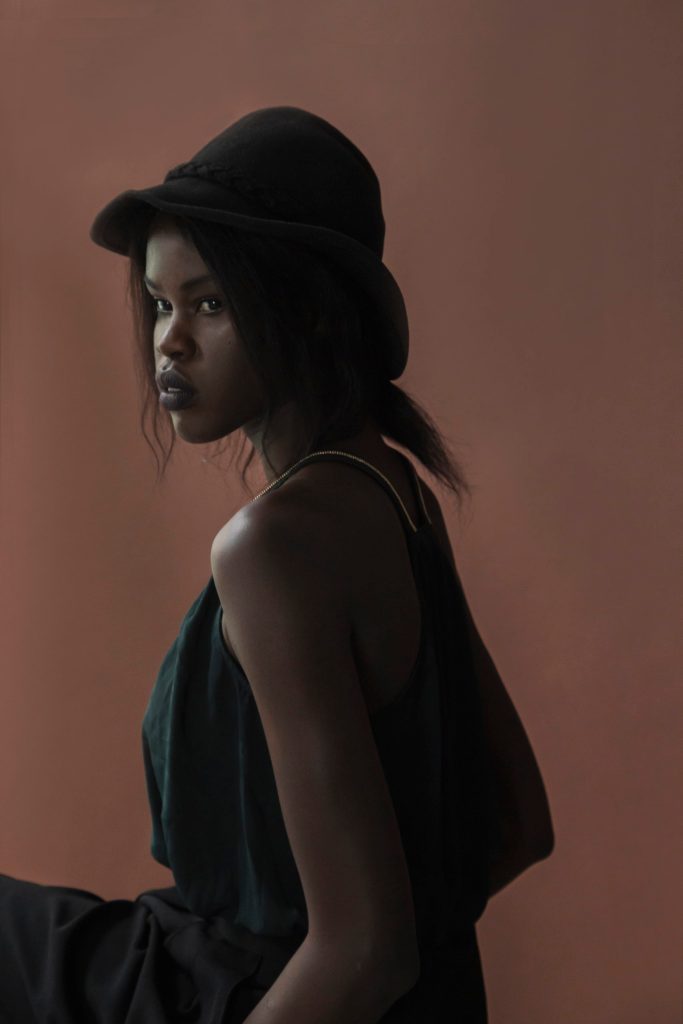
In your personal feminist utopia, what would International Women’s Day look like?
International women’s day would look like a day off for everyone, we take to the streets having parades commemorating different female figures [in] history.
How has your feminism grown and shifted in the last year(s)?
I used to think that being a feminist required strength but I learned that a women and her power dont always mean aggression. I learned that softness can be strength and there is no one universal feminist “way.”
What feminist work are you supporting right now? And how are you working to decolonize those industries and mediums?
I am launching a production company called “Adhel Productions.” Our aim is to connect our audience to deeper and richer stories that go far beyond the African Diaspora. We are an inclusive BIWOC, LGBTQA, and allies production company/agency. Our aim is to diversify the narrative and create platforms so voices that were once silenced can echo through time.
How are you celebrating International Womxn’s Day this year?
I will be celebrating at the VIWFF (Vancouver International Women in Film Festival) attending and supporting Womxn in the film industry.
Anything else you’d like to add?
Happy international womxn’s day everyone, much love
Adhel Arop
Leah Nelson
@antleah
Pronouns: She/Her
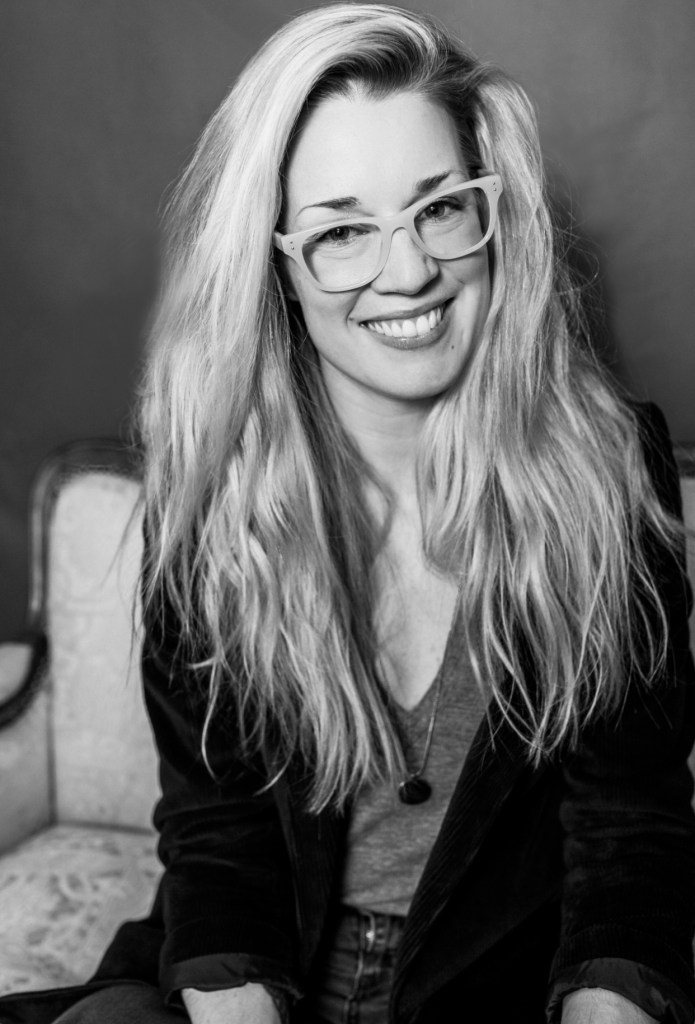
In your personal feminist utopia, what would International Women’s Day look like?
Every non-profit’s ultimate goal is to not need to exist, and in some ways, this is how I feel about IWD. Not that I don’t think women (and all the work that’s been done) should be celebrated all day, everyday in the future! I do! But if I think of a true utopia, for me, it would be a world where we have reached meaningful equality so much so that there is no longer a long, hard fight ahead, and so, we can just go on working, creating, collaborating and succeeding freely. That would be the ultimate best. That, and free tampons for all. 😉
How has your feminism grown and shifted in the last year(s)?
Grown?! I’m not even sure I could have identified my feminism a few years ago! So maybe it’s just been born and is still in its infancy? One major change in the last five years is that I became a mom, of boy/girl twins, so that really shifts your perspective. And because I’m bringing up a boy and a girl simultaneously, I’m hyper aware of everything to do with gender and equality (as it pertains to them). There are things I had never considered or noticed before, like when people would say to my daughter, “oh look at your pretty dress!” and say to my son “what did you learn in school today?” within the same breath. I’m really curious when those things happen and and of course protective of them both, but it also reminds me to be conscious of what I’m saying to them and the message it sends. When they were three-years old, I wanted to go to the Women’s March, but could only take one of them with me (because who wants to chase two 3 years olds, running in opposite directions, in a crowd!?). I chose to take my son because I felt (and feel) strongly that I want to bring up a boy/son/man who respects woman and knows what equality really means.
What feminist work are you supporting right now?
Again, this is all very new to me, but I’ve recently hooked up with Free the Work (formerly Free the Bid) This is an organization that is making meaningful change in my industry (commercial film making). A few years ago, I was happily working as a Director/Producer and because I had my little niche worked out, I wasn’t out there competing for work (in a sea of male directors). Now that I’m wearing a different hat with Kiddo, as EP where I’m essentially representing talent, I’m suddenly extremely aware of how challenging the landscape is for them to break into. But I’m happy to report that even in the short time I’ve been involved, I’m seeing serious change for the better, so I’m going to stick with this organization, do what I can from the ground. Mostly, I’m giddy about the incredible films that I’m going to get to watch (and am already watching) as this thing really cracks open and our screens are flooded with the work of astonishingly talented directors.
How are you celebrating International Womxn’s Day this year?
I’m not sure yet! But whatever I do, I’ll take my kids (both of them this time) because I want them to be a part of it.
Anything else you’d like to add?
When you see a little girl, ask her her name and what she wants to be when she grows up.
Maggie Anderson
@graceclubyvr
Pronouns: She/Her/Hers
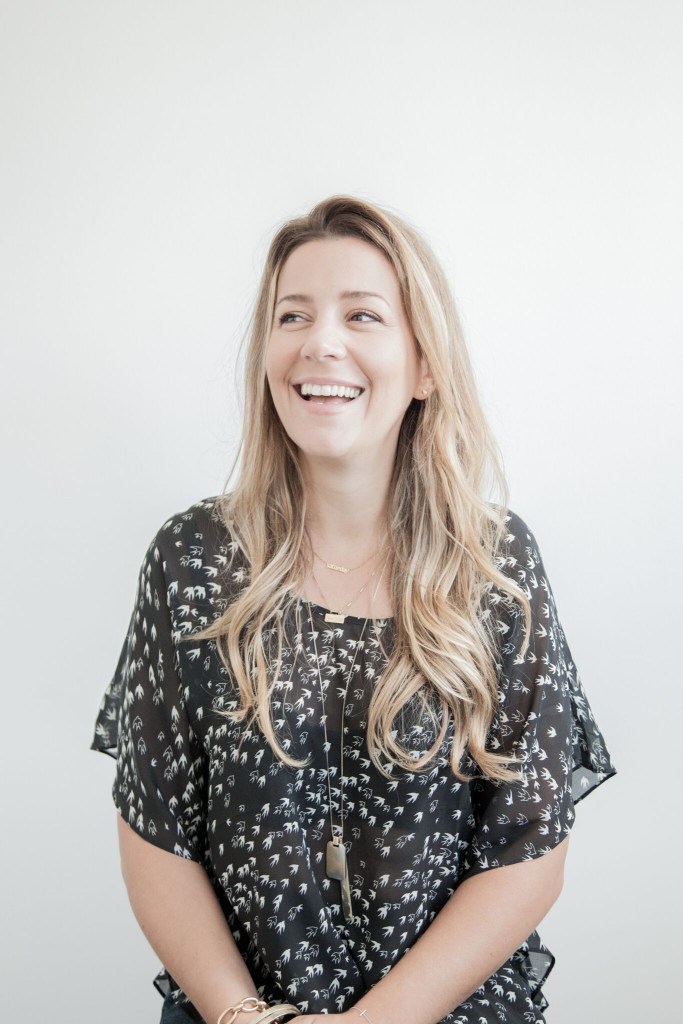
In your personal feminist utopia, what would International Women’s Day look like?
The perfect International Women’s Day would be a peaceful revolution where RCMP back off Indigenous Land, everyone gets access to clean drinking water and nourishing food, politicians admit their mistakes, trolls feel the harm they cause, leaders lead with compassion and curiosity instead of with ego and fear, the Patriarchy is smashed, sexualized violence is obliterated, restorative justice prevails, the oppressed are free, privileged people share their wealth, opportunity, power, and property. In the meantime, I will continue to strive for a society where EVERY day all over the world people of colour, folx with disabilities, womxn, trans and non-binary folx are respected and celebrated.
But if you really want me to answer the question, whatever that day looks like, at the very least, it needs to involve friendship, cackling, and tiramisu.
How has the feminist lens of Grace Club grown and shifted in the last year(s)?
We’ve definitely come a long way over the past three years. When we first started, we were curating events for self-identified womxn. We’ve since adjusted our events to include all genders, all expressions, all humans…we don’t want someone’s identity to exclude them from these conversations. More recently, I’ve been expanding my understanding of feminism from an intersectional focus into including the awareness and work of anti-racism and decolonizing. I am learning how much unlearning this work involves!
What feminist work are you supporting right now? And how are you working to decolonize those industries and mediums?
I’m focused on Inclusion and Decolonizing, and that means cultivating relationships with Indigenous communities. I want Grace Club to be a place that heals, not harms.That requires a lot of listening, and a lot of learning, and un-learning. I’m passing the mic, bringing on BIPOC/LGBTQ2S+ hosts, continuing to champion diversity in our speakers and donate to grassroots organizations who support the people we marginalize.
We are offering more Grace Labs, which are deeper dives with expert educators into topics such as embodiment, unconscious bias, decolonizing, and disrupting the narrative. To build on the community we’ve cultivated, we’re also curating monthly book club gatherings, featuring books with social justice themes.
Going forward, we are dedicated to collectively breaking down barriers and building bridges.
We are using the Grace Club platform to uplift voices that have been silenced, and to create brave spaces to share ideas and experiences while motivating activism within our community. It’s ultimately a speaker series for growth, but we are also a place for deep connection to occur.
How are you celebrating International Womxn’s Day this year?
I’ve recently started therapy (shout out to Vancouver Brain Lab!) and it’s been revolutionary. After suffering major burnout and anxiety last year, I am learning to…get this…give myself grace.
I’m finding that I need to be super mindful of how much I take on, and stop the glorification of being busy. It’s an extremely valuable lesson. That means I didn’t plan or organize anything for IWD, and am content to support other events being offered. My day will most likely involve a hit of nature, my kids, some friends, the couch, and a cuddle puddle. In that order.
Anything else you’d like to add?
Grace Club is always looking for suggestions, speakers, sponsors, volunteers and collaborators. Please reach out if you would like to apply.
Kat Jayme
@kjayme_films
Pronouns: She/Her
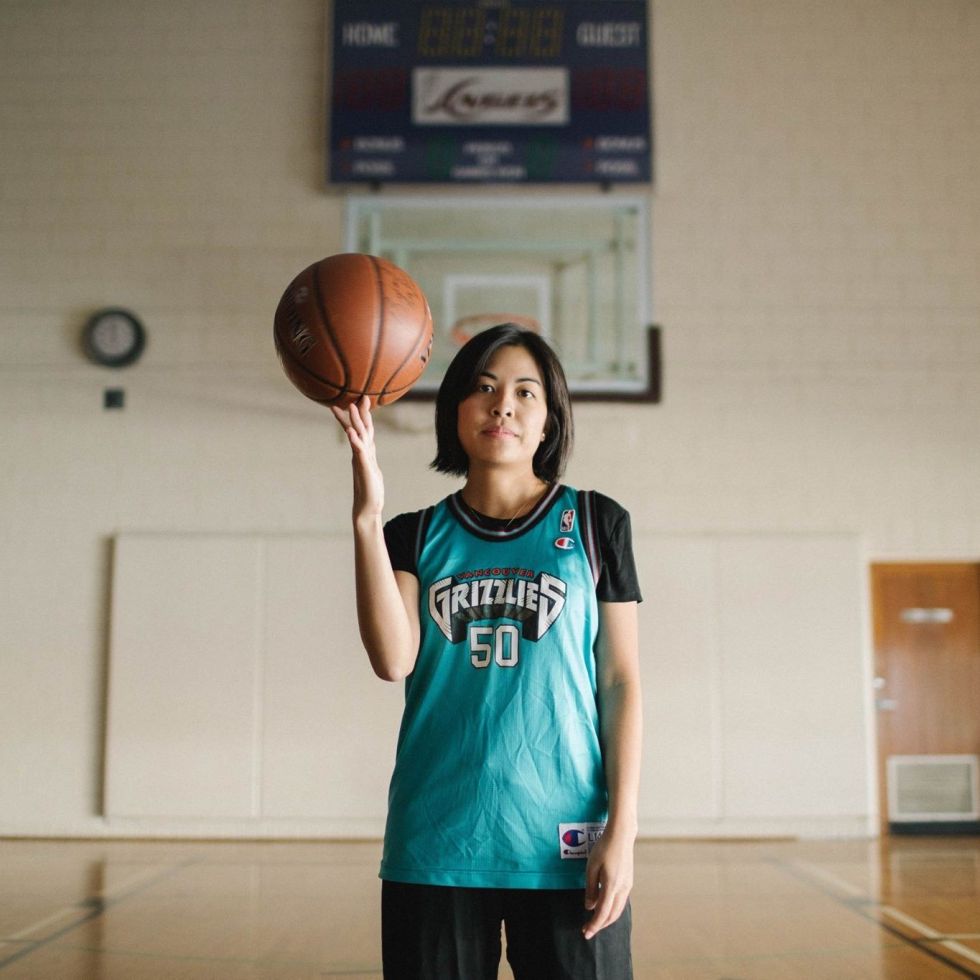
In your personal feminist utopia, what would International Women’s Day look like?
My personal feminist utopia would be a huge dance party where we all get together to dance the night away and celebrate the women in our lives and their accomplishments! Prior to this, the day would be filled with learning. I believe that education is key especially at a young age and so International Women’s Day would be an opportunity for young boys and girls to learn about the strong women who often get left out of our history books.
How has your feminism grown and shifted in the last year(s)?
Honestly, I feel like my feminism journey is still quite new. I’m still learning but more importantly I’m unlearning so many things that I’ve only recently come to realize are not okay. I was raised by strong women so know how powerful it is to be surrounded by empowered female figures. However thinking back, I still functioned (as we all do) in a man’s world. For example, when I was a kid I wanted to be the first girl to play in the NBA –not the WNBA. Although it’s a cute thought, it’s only recently that I’ve thought about how it’s also kinda messed up. The thing is, back in the ‘90s the WNBA was just starting and because it was a new league, Canada didn’t get too much exposure to it so I never saw any games on TV. So instead of wishing I could be like and thinking I was like Sue Bird and Diana Taurasi (WNBA superstars), I saw myself in Steve Nash and Bryant Reeves (NBA superstars). I thought I was them and I thought I could be them. The thing is, I’m not a 6’1 white male and being a 5’1 Filipina-Canadian, no one ever sees me as that. And this is why I believe representation is so important. We need young girls to see themselves EVERYWHERE especially in industries that are dominated by males. Young girls need to know that there is space for them and that they have a voice.
What feminist work are you supporting right now? And how are you working to decolonize those industries and mediums?
I am so blown away and inspired by the work of my peers. I’m so fortunate and grateful to be surrounded by a pretty bad-ass cohort of female filmmakers and we lift each other up. Shine theory, baby! I love the idea of the shine theory and really relate to the notion that we are all in it together, that we can all benefit from our creative relationships with each other and that we are all collaborators and not competitors. You shine, I shine! These groups of ladies are also my main resource for learning and growing.
I believe education is key especially at the grassroot level. I also believe that teaching empathy to children at a young age is essential for progress. I’m currently doing a tour of my films to high school and elementary school kids. We watch my films, then do a Q&A, and I get to talk not only about the process of filmmaking but about how to face rejection and adversity, how to protect your dreams, how to be a student athlete and role model, and how to persevere even after you hit a brick wall. There are some screenings that are co-ed and some that are just boys and some that are just girls. All of them are important. However, I do feel an extra bit of responsibility and come out with a bit more fire when I do have a session with just elementary or high school girls. It’s important for them to see themselves and to hear that they are strong enough to be whoever they want to be. I always ask myself, “Who would I have wanted to have as a role model when I was a kid?” and then just be that person. I also believe that it’s important for the boys student cohort to see a badass (female) filmmaker. From a young age, they can also look up to females and treat them with respect and equality in whichever industry they end up in when they’re older.
In addition, I’m currently working on two sports-related documentaries and have been working in this genre for about two years. The more that I’ve been in this sports world, the more I’ve realized how there needs to be more female voices in the room. I wouldn’t necessarily label what I do as “feminist work”—it is simply MY work, and I happen to be a female, and I happen to work in a male-dominated field. More often than not, I’m still the only woman in media scrums and I often feel like everyone is looking at me like I don’t belong. But women play sports, we watch sports, so we need to be part of these narratives as well. There’s no doubt that the lack of equality in sports and filmmaking motivates me even more, but I don’t do what I do because of a feminist agenda. I do what I do because it’s who I am, and I see no limits to where my passions and skills can take me. That is how I think every girl and woman needs to approach her goals, by truly embracing herself and fearlessly going after what she wants and deserves.
How are you celebrating International Womxn’s Day this year?
I’ll be working away on my next film as we are about to travel for our next shoot at the end of the month. But I’ll also be setting aside time to read some articles and listen to some podcasts by Ava DuVernay, Jill Soloway, and Emily Best. And I’ll definitely be spending time with my mom, the strongest woman I know.
Shanique Kelly
@softieshan
Pronouns: She/Her
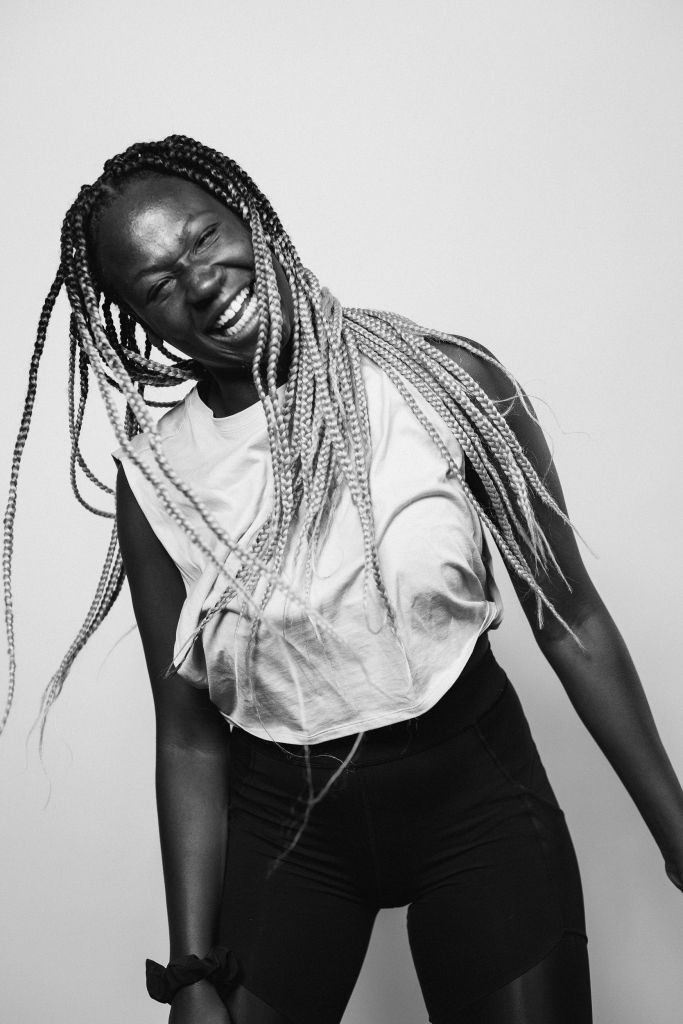
In your personal feminist utopia, what would International Women’s Day look like?
In my personal feminist utopia on International Women’s Day, Beyoncé with her full marching band made up of black women and all are her black female dancers would perform a live concert in the middle of the street and only people who treat trans women with respect and kindness would be allowed to attend. Sex work would be decriminalized worldwide. Every person on earth who plans on giving birth would be given paid two year maternity leave. The cure for endometriosis would be discovered and period products would be given away for free. In this utopia on this special day, a beam would come down from the sky and implant in everyone’s brain the true meaning of intersectionality. Doctors would be forced to look at why Black Women and Indigenous Women are three times more likely to die during pregnancy than white women. Everyone would feel good and happy in their bodies and Rihanna would be around after the Beyoncé show and we’d just hang out and she’d do my make up.
How has your feminism grown and shifted in the last year(s)?
My feminism is growing and shifting every day it feels! In my early years of embracing feminism I viewed it as very black and white–there were women and there were men and we deserved to be equal! As I’ve gotten older, I’ve learned that there is so much more to feminism than wanting what men have. Feminism should be about empowering and shining light on those who experience the most marginalization, lifting them up and providing them with a platform. Women are powerful, beautiful and amazing but if we aren’t including BIPOC women, trans women, women with disabilities, queer women, and sex workers in our conversations about how amazing women are then there really isn’t much of a point. When we exclude the voices of the people who traditionally experience the most harm, then we are really just contributing to the patriarchy’s tyranny.
What feminist work are you supporting right now? And how are you working to decolonize those industries and mediums?
Right now my work is largely in supporting BIPOC women who want to experience safe and fun nightlife space as well as those who want to learn how to create their own community spaces through learning how to DJ. I organize a monthly queer hip hop dance party called LEVEL UP (@level.up_yvr) and just started a new initiative called CUE CLUB that aims to teach women and non binary folks how to DJ and throw their own events. I work to decolonize the music and nightlife industry by showing up and taking up space, and by offering women the tools needed to do the same.
How are you celebrating International Womxn’s Day this year?
I think I will celebrate International Womxn’s Day this year by maybe buying myself some flowers or a new plant. I will message some of the women in my life and tell them that I love them. I babysit the sweetest two-year-old girl in the world and I will wish her a Happy International Womxn’s Day, too, and even though she won’t know what that means I will bask in the glory that is being around a woman so young, tiny and perfect. In the evening, I have dinner plans with my sweet and wonderful partner and their equally wonderful mother. I’ll spend the day expressing gratitude for the ones I love and doing the things that bring me joy.
Melina Laboucan-Massimo
@melina_miyowapan
Pronouns: She/her
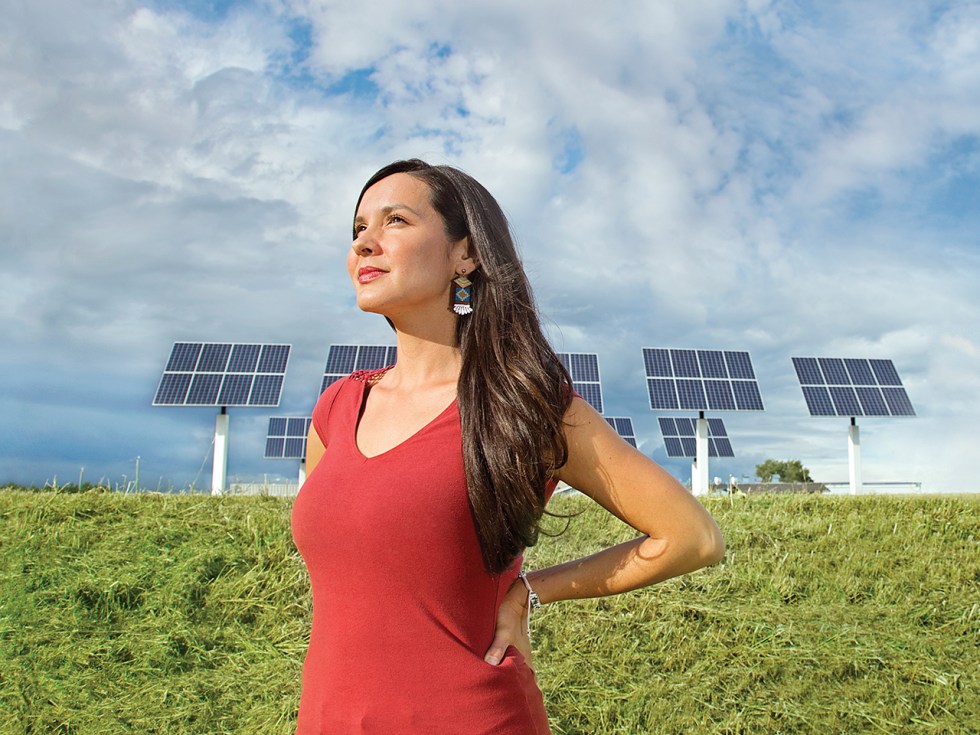
What does IWD mean to you?
International Women’s Day means to me that we uplift the stories and the achievements of women that many times go unseen and unheard.
Is empowering women crucial to the work that you do?
Definitely. I think for me working on land rights issues for a majority of my adult life, I’ve worked mostly with women. For a lot of Indigenous land issues, young women are doing the work. The majority of my adulthood, I’ve worked with a strong uprising of women who are working on land issues, water protection, and murdered and missing Indigenous women justice. I think for me, it definitely is tied to that, as well.
How has your feminism grown and shifted?
It’s interesting because we use the word feminism or Indigenous feminism, and for us as Indigenous peoples, we never really had that word because back before colonization happened there was matriarchy and more of a balance role. We didn’t have to have a word that described the reaction against patriarchy. So for me, since I was in my young twenties, I’ve seen myself as more as just Indigenous. We already have traditionally in our government systems roles of equity and traditional and equal decision making. I’d say that I haven’t seen that play out yet otherwise. For me, I would like to see bringing back the matriarchy and the ability for Indigenous women to have a balance in our voices and equity in decision making to be shared like it was before, as opposed to now where we have an imposed patriarchal and capitalist systems which oftentimes slash the way in which our communities can speak for themselves.
I know it’s being taken back and like most terms they are being reclaimed and repurposed, and so I think that’s why we see Indigenous feminism, but sometimes I think the history of feminism is ignored, unless you look at the 3rd or 4th wave where they start encompassing people of colour and Indigenous peoples. I know for me when I was in my early twenties that there was a reaction against feminism because it wasn’t inclusive of BIWOC.
What feminist work are you supporting right now and how are you working to decolonize those spaces?
For me, I work on the issues of Missing and Murdered Indigenous Women and more specifically, my sister’s case and her unsolved death. My sister passed in 2013 and I had worked on environmental climate justice issues prior to that, and have for about 15 years, and so that connection for us as Indigenous peoples is saying violence against the land is violence against women, and violence against women is violence against the land. A lot of times when I first started saying that seven years ago, a lot of people said, “What are you talking about?” I was pushed back from environmental groups I was working with because they didn’t see the connection.
It’s about bringing a wider perspective to climate and environmental justice issues that include the safety of our women and our communities because of resource extraction. But also for MMIW, a lot of the pushback I’ve had from talking with the media and other people about these issues has been the stereotypical perspective still that exists that put our women “high risk women” and the victim blaming that have existed.
A lot of people have made assumptions about my sister’s lifestyle and where she came from and my sister had just finished college and people and police just made assumptions like she was [a drug-user]. It came to bear how our women are portrayed. It has been a critical act against the media and saying that I know this doesn’t fit within your story, but I really don’t appreciate that. For having a decolonial lense, it’s understanding that there is a whole spectrum of women that are missing and murdered and it’s not just the women that are on the street. There’s violence against Indigenous women everywhere and it’s not just “high risk” stereotypical women. That’s what I’ve been talking to people about because it really bothered me when people made that assumption about my sister because it was so far from the truth and it felt like a lot of victim blaming and pigeon holing who Indigenous women are in our communities.
My sister was a cultural carrier in our community, she had a degree in creating modern fashion with traditional beading. It includes all of the amazing things of how women hold culture within our communities and when women are taken, or killed, or go missing, it has a huge impact on our communities, families, and culture. For me, it is about creating a decolonial view of our women.
How will you be celebrating International Women’s Day this year?
A big lesson for me this past year was learning that because I’ve been doing social justice work for almost 20 years since I was a teenager, I have pushed and pushed and overworked and didn’t take breaks and didn’t do the self-care that I was told about. When you’re from communities that there is so much need and so much going on and you’re in a constant state of crisis and trauma from the colonial project of Canada, I think a lot of times we don’t take breaks or time off or include ourselves in the circle of care that we are giving out externally. I talk a lot about reciprocity and what living in alignment with Mother Earth and each other is, and not just taking but giving back. As women, a lot of times we are givers, but we don’t know how to receive. So for me, it’s about actually learning to take care and to honour my body and to respect my boundaries and limits, so that I continue to do this work in a way that honours that.
Baljit Sangra
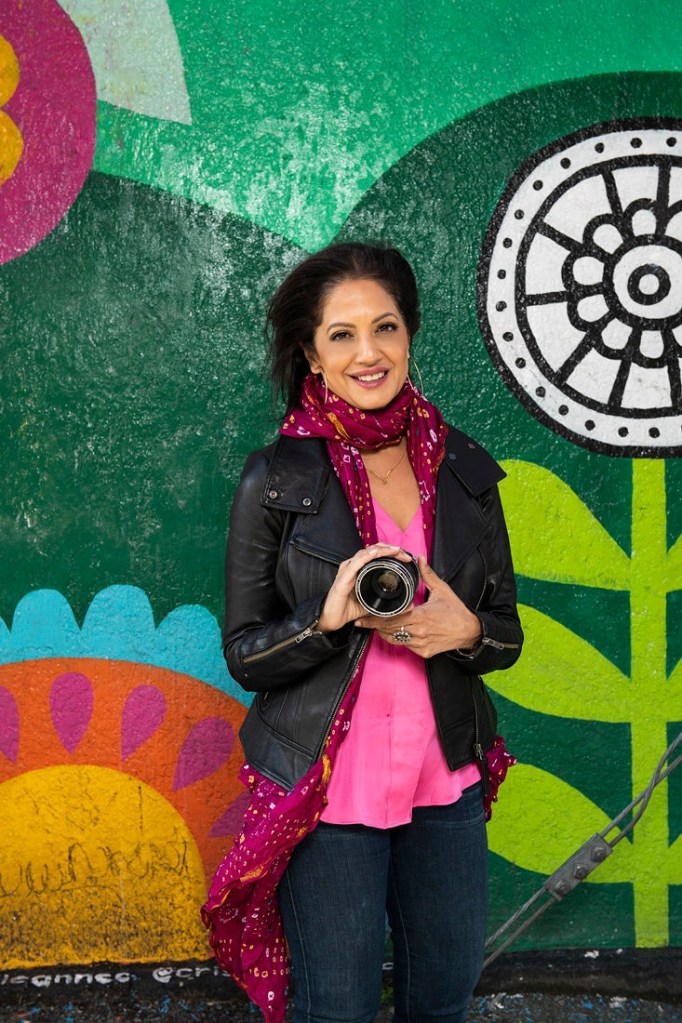
Pronouns: She/Her
@baljitsangra
In your personal feminist utopia, what would International Women’s Day look like?
For me, it would be a day where I honour women who walked before me, with me, and after me. There would be some tradition/ritual; I want to honour these connections and our divine power and spirit in whatever shape or form. A day to celebrate, honour and review our commitment to resilience, solidarity and love. Share the love to keep doing the work.
How has your feminism grown and shifted in the last year(s)?
This past year has been a remarkable, powerful creative journey of sharing a documentary on gender-based violence with diverse audiences across the world, and having conversations that unpack issues that challenge patriarchy and race. It’s been a profound experience to be in a collective space with audiences and to share this emotional experience together. It’s been a journey of celebrating resistors and silence breakers, and that’s been empowering. Throughout it all, I always think of my mom, grandmothers, great-grandmothers and feel their spirit pushing me and celebrating, too.
What feminist work are you supporting right now? And how are you working to decolonize those industries and mediums?
The revolution will not be televised–everyday we need to decolonize our art practices and our minds by any means necessary.
How are you celebrating International Womxn’s Day this year?
Reflecting and Celebrating in Glasgow post film festival with some amazing creative new friends. Trying to live everyday like it’s Women’s day!

